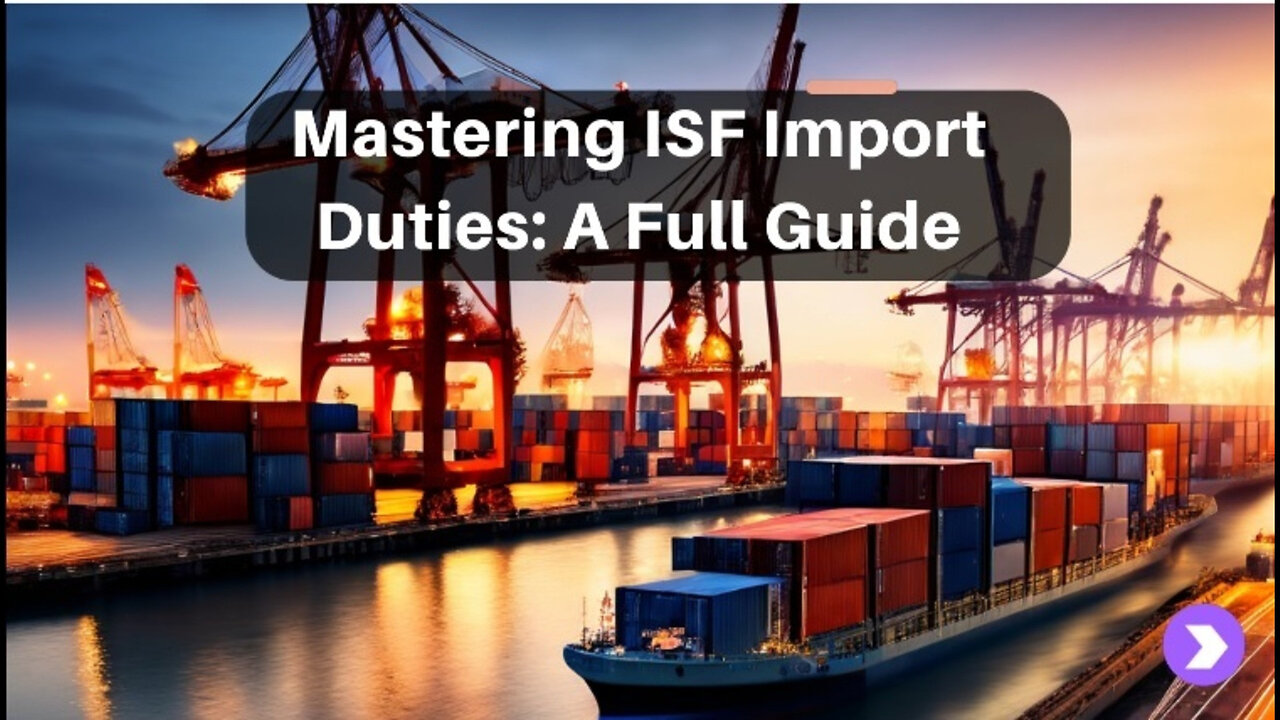Premium Only Content

Mastering the Duties of ISF Importers: Your Guide to a Smooth Import Process
ISF Checklist || 805-970-7918 || contact@isfchecklist.com || www.isfchecklist.com
In today's video, we delved into the essential duties of ISF importers in the customs brokerage process. These duties include obtaining a customs bond, initiating the ISF process, establishing effective communication channels with international partners, and navigating through the customs clearance process.
Obtaining a customs bond is the first step for an ISF importer. This bond serves as a financial guarantee that all duties, taxes, and fees associated with importing goods will be paid. It also ensures compliance with customs regulations and obligations. Failure to secure a customs bond can lead to significant penalties and delays in the import process.
Initiating the ISF process involves providing accurate and timely information to US Customs and Border Protection about the shipment. This includes details about the importer, seller, buyer, manufacturer, country of origin, and more. It is crucial to file the ISF at least 24 hours prior to the cargo being loaded onto a vessel to avoid penalties and potential cargo holds.
Effective communication channels with international partners, such as sellers, freight forwarders, and customs brokers, are vital for gathering accurate information and ensuring smooth coordination throughout the ISF filing process. Clear and consistent communication is the key to successful import operations.
Once the ISF is filed and the cargo arrives at the port of destination, the customs clearance process begins. This entails submitting additional documentation and paying any applicable duties or fees. It is essential to work closely with a customs broker who can navigate through this stage efficiently and address any issues that may arise.
During the customs clearance process, customs authorities may select the shipment for a physical examination based on risk assessment. This examination ensures that the cargo matches the information provided in the ISF and helps identify any potential security threats.
Throughout the entire ISF import process, a customs broker plays a crucial role as a trusted partner and advisor. They keep the importer informed about updates, changes, or issues related to the shipment and assist in resolving any problems. Working closely with a customs broker is essential for smooth and successful import operations.
In conclusion, fulfilling the duties of an ISF importer is crucial for compliance with customs regulations and ensuring a smooth import process. From obtaining a customs bond to filing the ISF, communicating with international partners, and navigating through the customs clearance process, importers must stay diligent and work closely with their customs broker. By doing so, they can achieve successful outcomes and avoid costly delays and penalties.
We hope you found this deep dive into the duties of ISF importers informative and valuable. Stay tuned for more videos on customs brokerage and international trade, and don't forget to subscribe to our channel so you don't miss out on any upcoming content. Thank you for watching!
#usimportbond #isfcustomsbroker #uscustomsclearing #isfentry
Video Disclaimer Here: This video is purely educational and has no ties with the US government.
00:23 - ISF Import Duties: An Overview
00:44 - Obtain a Customs Bond
01:13 - File ISF Timely and Accurately
01:56 - Work Closely with Customs Broker
-
 LIVE
LIVE
Wendy Bell Radio
5 hours agoNothing To See Here
11,793 watching -
 2:12:18
2:12:18
TheDozenPodcast
21 hours agoIslam vs Christianity: Bob of Speakers' Corner
45.6K12 -
 14:36
14:36
The StoneZONE with Roger Stone
1 day agoRoger Stone Delivers Riveting Speech at Turning Point’s AMFEST 2024 | FULL SPEECH
48K13 -
 18:59
18:59
Fit'n Fire
11 hours ago $4.23 earnedZenith ZF5 The Best MP5 Clone available
18K1 -
 58:34
58:34
Rethinking the Dollar
20 hours agoTrump Faces 'Big Mess' Ahead | RTD News Update
20.5K5 -
 5:35
5:35
Dermatologist Dr. Dustin Portela
20 hours ago $1.44 earnedUnboxing Neutrogena PR Box: Skincare Products and Surprises!
15.9K2 -
 11:20
11:20
China Uncensored
19 hours agoCan the US Exploit a Rift Between China and Russia?
42.3K15 -
 2:08:48
2:08:48
TheSaltyCracker
14 hours agoLefty Grifters Go MAGA ReeEEeE Stream 12-22-24
237K664 -
 1:15:40
1:15:40
Man in America
17 hours agoThe DISTURBING Truth: How Seed Oils, the Vatican, and Procter & Gamble Are Connected w/ Dan Lyons
139K128 -
 6:46:07
6:46:07
Rance's Gaming Corner
19 hours agoTime for some RUMBLE FPS!! Get in here.. w/Fragniac
170K4